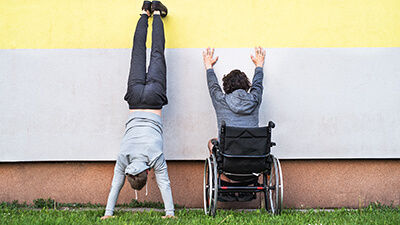What causes bowel dysfunction?
It is important to find the cause of the problem
Bowel problems, whether constipation or incontinence, are often just symptoms and not diseases in themselves. It is important to find the cause of a bowel function problem. For some, the cause is complex and has many contributing factors. For others, it may be related to certain conditions, such as age, results of childbirth or results of surgical intervention, or to diseases, such as neurological conditions.
For this reason, it is important to avoid self-diagnosis, but to enlist the support of a healthcare professional who can identify and treat any underlying causes.
An overview of the different causes and diseases relating to bowel dysfunctions can be found below:
Anorectal malformation
Children born with anorectal malformation (ARM) or Hirschsprung’s disease have a spectrum of anomalies of the rectum and anal canal. Even after undergoing surgical procedures, these children often still have problems controlling their bowel movements.
Neurological disorder
Neurological disorders can lead to symptoms of incontinence or constipation. Some of the neurogenic diseases listed below can cause bowel problems:
• Spinal cord injury
• Multiple sclerosis
• Spina bifida
• Parkinson’s disease

Following bowel surgery
After the treatment of rectal cancer (rectum resection), problems may occur. Someone struggling with frequent or fragmented bowel movement, urgency, and emptying difficulties, has some of the typical symptoms of “low anterior resection syndrome” (LARS). These symptoms can last for 3-9 months after surgery, but in some cases, they will stay up to 18 months or longer.
Childbirth
There may be difficulties in the control of bowel movements due to damage to the anal sphincters during childbirth, sometimes even after undergoing surgical repair.
A result of one or more childbirths can be a weak pelvic floor causing bulging of the front wall of the rectum into the back wall of the vagina (rectocele). A rectocele may cause problems in complete emptying of the rectum (incomplete evacuation), resulting in soiling episodes.
Lifestyle and age
Lifestyle can also influence bowel function. Lack of exercise can create a weak pelvic floor causing faecal incontinence. On the other hand, doing regular exercise has a positive effect on faecal incontinence as well as constipation.
Adequate intake of fluid and eating a balance diet, including fiber, can increase control of the bowel.
As we age, the bowel function changes and the risk of constipation, as well as stool incontinence, increases. Bowel dysfunctions are very common in the geriatric population, and therefore many people wrongly consider it a normal part of aging. As a result, older people and their relatives are often reluctant to seek help.

How does bowel dysfunction affect your life?
Bowel problems are usually not life threatening. However, they can certainly affect your daily life.

Bowel irrigation
Bowel irrigation – sometimes called transanal irrigation (TAI) or rectal irrigation (RI) has been practiced for many hundreds of years.

Our story
We aspire to deliver quality solutions for all, by designing solutions that put people on the road towards living their best, most fulfilled lives.

Julian’s story
I no longer suffer bloating, wind or feel poisoned by full bowels…
I would thoroughly recommend bowel irrigation.
